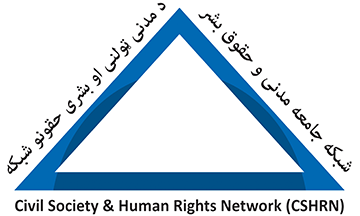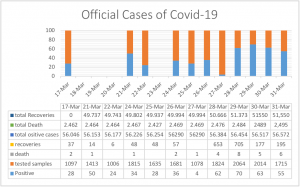Bi-weekly Situation Report
No. 6 (March 16, 2021 – March 31, 2021)

Civil Society and Human Rights Network
Purpose:
This bi-weekly report describes the updates and challenges related to the government’s relief response program, known as Dastarkhan-e-Meli, and health assistance in combating Covid-19 in Afghanistan.
Time Coverage: The report covers all the measures undertaken from March 16 to March 31, 2021, by the government in Afghanistan concerning health and humanitarian assistance during the Covid-19 pandemic.
Situation Overview:
- Covid-19 New Update:During this period, the official report indicates several new positive tests, recoveries, and deaths. Due to a weak health system and mismanagement, however, more people prefer home-based treatment. As a result, it has made it difficult to track the exact numbers of positive cases.

- Following the conduct of Covid-19 vaccines in Afghanistan, concerns are mounting over the safety of the Covid-19 doses which has discouraged the population to test. The first unconfirmed case was reported from Bamiyan in which a medical worker died shortly after testing the Indian donated Covid-19 vaccine. It is not yet clear whether or not the Indian AstraZeneca’s donated vaccine has caused the death. To address the public concerns, the government needs to enhance awareness and to ensure the safety of the vaccines.
- Challenges in implementation of Datarkhan-e-Melli:
- Bamiyan province:
Following the Dastarkhan-e-Melli program, the reports confirmed serious mismanagement and lack of transparency in aid distribution to the needy families in Bamiyan province. According to CSHRN’s focal point in Bamiyan, Dastarkhan-e-Melli program is undermined by the following problems in Bamiyan:
- Low quality food packages have been distributed to the families covered by the program. Based on findings, the food packages assisted had low quality such as bitter flour, burnt beans, spoiled rice and cooking oil.
- Food packages have been distributed to families associated to Mr. Ansari’s relatives, who is currently advisor to the Second Vice-President.
- The distribution lists include individuals who, according to report, passed away years ago in the districts of Panjab and Waras.
- Prepared “ghost list” of participants who do not live in the districts of Panjab and Waras. in Bamiyan province, only %30 of the needy families from Waras and Panjab districts have received humanitarian assistance under Dastarkhan-e-Melli program.
- Khost Province:
On March 28, 2021, around 98 families in Mandozai and Garbzo districts of Khost province received food packages provided by Dastarkhan-Melli program. Previously, the program had been suspended due to unfriendly security circumstances and lack of financial budget.
- Herat province:
Families in the 10th, 11th, 12th, 13th, and 15th PDs of Herat city have received aid packages. However, according to findings, the distribution list prepared is against the criteria under Dastarkhan-e-Melli program in which rich families were also provided food packages.